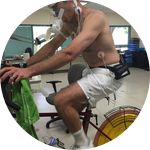About This Project
Physical inactivity is a major contributor to mortality and development of chronic disease. Many people avoid physical activity because it is perceived as unpleasant or too “hard”. Caffeine has been shown to improve mood and enjoyment of exercise. This study seeks to determine if caffeine will increase physical activity over 12 weeks. Results will inform a National Institutes of Health application to investigate caffeine's ability to increase exercise adherence.
Ask the Scientists
Join The DiscussionWhat is the context of this research?
Our lives are very efficient. We drive everywhere, take the elevator or escalator, and sit at desks all day. This has severely curtailed our physical activity (1), while at the same time, our body weight and prevalence of individuals who are overweight and obese has increased (2). This is critically important because being overweight/obese and/or physically inactive significantly increase our health risks (3). Currently, obese men and women achieve 14-23 minutes of moderate activity (such as walking) and 0.25-0.5 minutes of vigorous activity (such as jogging) per day, far below public health guidelines (4). It is possible that many of these individuals have an aversion to physical activity as they may perceive it as too hard, too painful, or unpleasant (5).
What is the significance of this project?
I have previously shown in healthy individuals, caffeine consumed before exercise (one hour of moderately hard cycling) caused exercise to feel easier and more enjoyable (6). I also have a similar project currently underway in overweight/obese individuals and we are seeing similar trends in our results. Thus, providing measured doses of caffeine as a way to "dope" people into participating in more activity could be a potential public health strategy to increase participation in moderate/vigorous exercise (7), which has a number of well known health benefits. Results from this study and prior research will be used to prepare an application to the National Institutes of Health to examine caffeine's ability to increase adherence to a structured exercise program.
What are the goals of the project?
The primary goal of this study is to determine if caffeine supplementation can increase physical activity. Participants will be individuals who do not meet existing physical activity guidelines of 150 minutes of moderate exercise/week. Weight status and body mass index will not determine eligibility. All participants will be screened using a health history questionnaire to make sure they are healthy enough for moderate exercise. Participants have a 50/50 chance of receiving caffeine treatment or a placebo. They will receive 2 doses per day for 12 weeks. Doses will be equivalent to about 2 cups of strong black coffee (200-300 milligrams/dose). They will be asked to take one dose in the morning and another in the afternoon.
Budget
The FitBits serve two purposes. Firstly, they are a participant incentive (they will keep their device as part of their “gift”). This will help with recruitment and retention for the study (who doesn't want a free FitBit?!). Secondly, it will allow us to track their activity throughout the study. Though inaccurate compared to the gold standard of doubly-labeled water (1), devices such as the FitBit provide useful feedback to individuals and by themselves may promote activity, which is why all individuals in the study will receive one. Having a self-monitoring device is crucial for this study because it enables us to objectively track what our participants are doing and not have to participant recall which is open to bias.
Pharmaceutical grade caffeine (food-safe, similar to No-Doz tablets) will be used for the treatments and will be prepped in opaque capsules along with a placebo treatment consisting of corn starch. Treatments will be visually identical.
Endorsed by
Meet the Team
Affiliates
Matthew Schubert
I am an exercise physiologist with a diverse background but special interest in energy balance, metabolism, and nutrition. My main research interests revolved around the interactions of physical activity and diet. Current projects are exploring ways to use caffeine to increase physical activity in inactive individuals, whether interval training increases metabolic rate, hydration habits of female collegiate athletes, and some pilot work on whether complete caffeine abstention influences glucose and insulin metabolism in type 2 diabetes.
Additional Information
Further details of the study can be found under research methods!
Project Backers
- 8Backers
- 16%Funded
- $775Total Donations
- $96.88Average Donation


